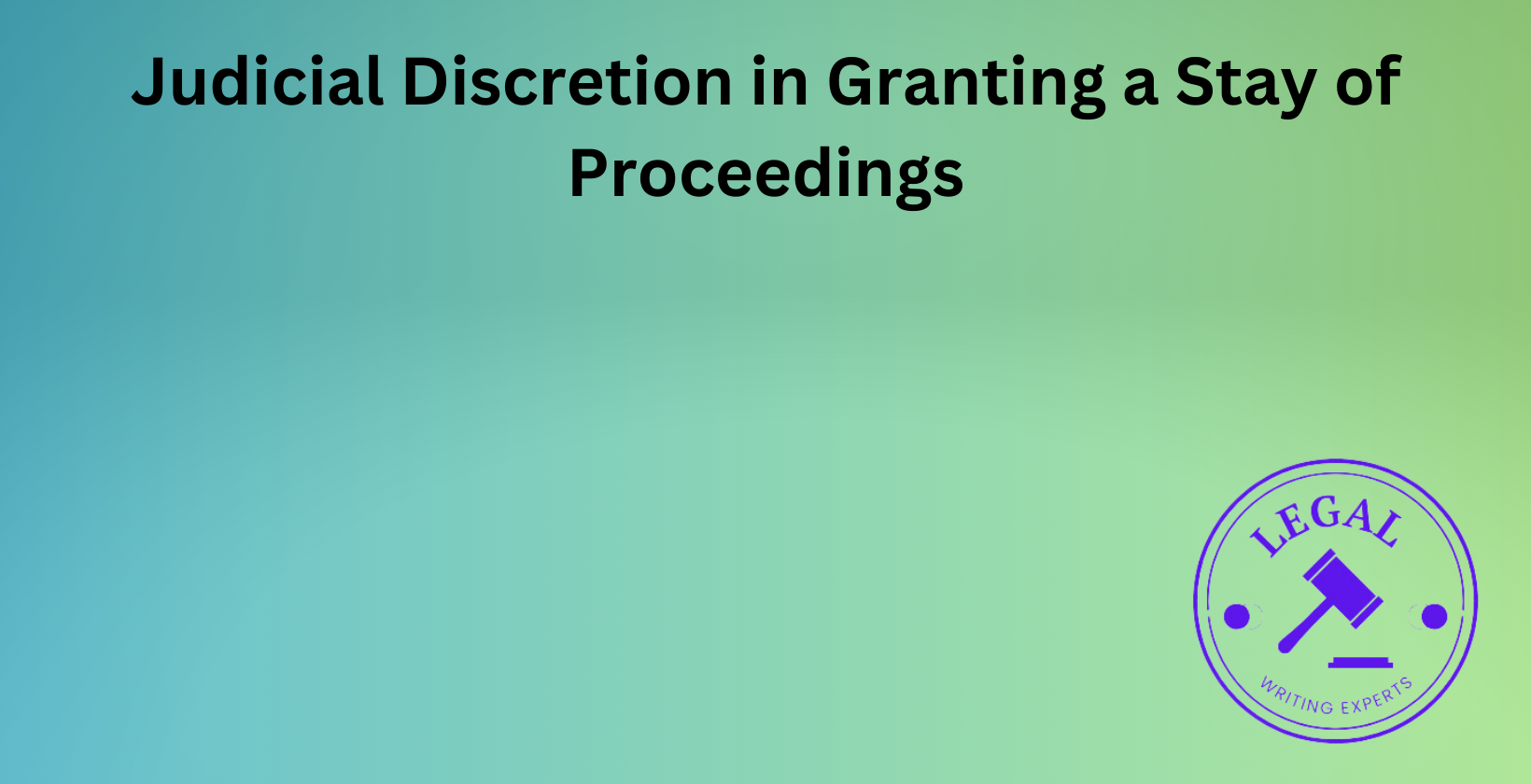Judicial Discretion in Granting a Stay of Proceedings
Written by
Jessica E
March 12, 2025 · 8 min read

Judicial discretion in granting a stay of proceedings is a critical aspect of the legal system, allowing courts to temporarily halt a case under specific conditions. Judges have the authority to decide whether a stay is necessary based on legal principles, the nature of the case, and the interests of justice. A stay of proceedings may be requested for various reasons, such as awaiting the resolution of a related case, preventing injustice, or ensuring a fair trial. Understanding how judicial discretion applies to stays of proceedings helps individuals navigate the legal process effectively.
What Is Judicial Discretion in Granting a Stay of Proceedings?
Judicial discretion in granting a stay of proceedings is the authority given to a judge to temporarily suspend a case based on legal and factual considerations. Courts use this discretion to prevent undue prejudice, ensure procedural fairness, and manage caseloads efficiently. A judge must assess whether halting proceedings serves the interests of justice, considering statutory guidelines, case precedents, and the rights of all parties involved.
How Does Judicial Discretion Affect the Stay of Proceedings?
Judicial discretion affects the stay of proceedings by determining whether a case should be paused and under what conditions. The judge evaluates factors such as potential harm to either party, the likelihood of success in a related case, and the necessity of the stay to ensure a fair trial. Courts balance these considerations to prevent unnecessary delays while protecting legal rights.
What Are the Legal Grounds for Granting a Stay of Proceedings?
The legal grounds for granting a stay of proceedings include pending related litigation, procedural irregularities, constitutional violations, and abuse of process. Courts may grant a stay to prevent conflicting rulings, safeguard due process, or allow time for alternative dispute resolution. Statutes and case law provide guidelines on when a stay is appropriate.
How Do Courts Determine Whether to Grant a Stay of Proceedings?
Courts determine whether to grant a stay of proceedings by evaluating the merits of the request, the balance of hardships, and the interests of justice. Judges consider whether proceeding with the case would result in unfairness, whether the stay is necessary to resolve a key legal issue, and whether granting the stay aligns with public policy. Each case is assessed on its unique circumstances.
What Factors Influence Judicial Discretion in Granting a Stay?
Factors influencing judicial discretion in granting a stay include the complexity of the case, the stage of proceedings, the risk of irreparable harm, and the conduct of the parties. Judges assess whether the stay promotes judicial efficiency, prevents duplicative litigation, or mitigates prejudice. Legal precedents and statutory requirements guide their decision-making process.
How Does the Timing of a Motion Impact the Decision to Grant a Stay?
The timing of a motion impacts the decision to grant a stay because delays in filing can undermine the credibility of the request. Courts consider whether the motion was made promptly and in good faith. A timely request strengthens the argument for a stay, while a late submission may be seen as a tactical maneuver to delay proceedings unfairly.
What Is the Process for Filing a Motion to Stay Proceedings?
The process for filing a motion to stay proceedings involves drafting a formal request, citing legal justifications, and submitting the motion to the court. The party seeking the stay must provide supporting arguments and evidence demonstrating why the pause is necessary. Courts may require a hearing before ruling on the motion.
How Can One Draft a Motion to Request a Stay of Proceedings?
One can draft a motion to request a stay of proceedings by outlining the legal basis, providing supporting case law, and demonstrating how the stay serves the interests of justice. The motion should be structured clearly, including an introduction, factual background, legal arguments, and a conclusion. Hiring a legal document drafting service ensures accuracy and compliance with court requirements.
Where Can I Find Legal Assistance to Draft a Motion for Stay of Proceedings?
Legal assistance to draft a motion for a stay of proceedings can be found through legal writing services or freelance legal research professionals such as Legal Writing Experts. Online legal document review services near me provide expert guidance in preparing well-structured motions that meet judicial expectations.
What Are the Potential Outcomes After a Stay of Proceedings Is Granted?
The potential outcomes after a stay of proceedings is granted include case suspension until a related issue is resolved, modification of trial schedules, or withdrawal of claims. Courts may impose conditions on the stay, such as requiring periodic status updates or setting a deadline for resumption. The case may proceed after the stay is lifted or be dismissed depending on circumstances.
How Does a Stay of Proceedings Affect the Overall Timeline of a Case?
A stay of proceedings affects the overall timeline of a case by pausing litigation, potentially extending resolution times. Courts consider whether the delay is justified and ensure that the stay does not cause undue hardship. While a stay can prolong legal proceedings, it may ultimately lead to a more just outcome by allowing necessary legal issues to be addressed first.
What Are the Implications of a Denied Motion for Stay of Proceedings?
The implications of a denied motion for a stay of proceedings include the case proceeding without delay, potential prejudice to the requesting party, and additional legal costs. If a court finds insufficient grounds for a stay, the parties must continue litigation. Alternative legal strategies may be necessary to address the concerns that led to the motion request.


